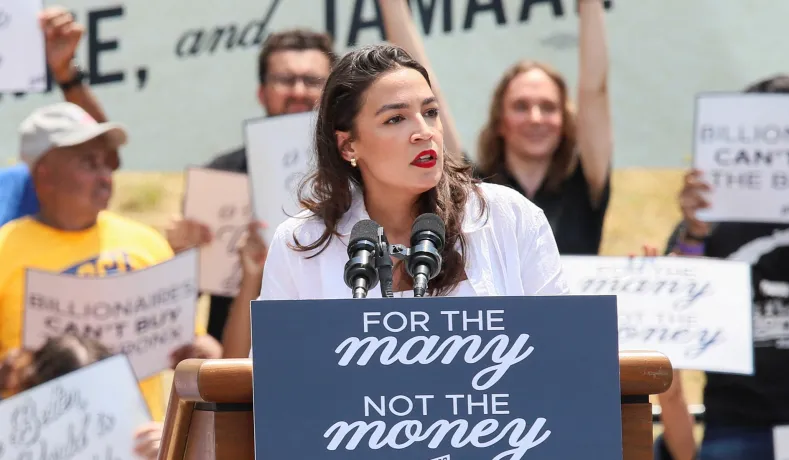The Democratic Socialists of America (DSA) have recently made headlines by withdrawing their support from one of their most prominent members, Rep. Alexandria Ocasio-Cortez (AOC). This decision stems from a growing discontent within the DSA regarding AOC's stance on Zionism and her perceived lack of commitment to anti-Zionist principles. This move has sparked a significant debate within progressive circles about the boundaries of political alignment and the complexities of the Israel-Palestine conflict.

Background of the DSA and AOC
The DSA, founded in 1982, is a political organization that aims to promote democratic socialism in the United States. It has grown significantly in recent years, buoyed by a wave of progressive activism and the rise of prominent politicians like Bernie Sanders and AOC. Alexandria Ocasio-Cortez, elected to Congress in 2018, has been one of the most visible faces of the DSA, advocating for policies such as Medicare for All, the Green New Deal, and criminal justice reform.
The Issue at Hand
The controversy began brewing as the DSA’s stance on Zionism and Israel-Palestine relations became more pronounced. The organization has adopted a firm anti-Zionist position, aligning itself with the Boycott, Divestment, Sanctions (BDS) movement and advocating for Palestinian rights. Members of the DSA have expressed increasing frustration with AOC’s more moderate approach to the issue, particularly her support for a two-state solution and her reluctance to fully endorse BDS.
AOC’s Position on Israel and Palestine
AOC has publicly supported Palestinian rights and criticized Israeli government policies, but her approach has been more measured compared to the DSA's stance. She has advocated for a peaceful resolution to the conflict and supported measures to ensure humanitarian aid for Palestinians. However, her critics within the DSA argue that her support for a two-state solution and reluctance to endorse BDS reflect a compromise that does not align with the DSA’s principles.

The DSA's Decision
In a recent vote, the DSA decided to withdraw their official support from AOC, citing her insufficiently anti-Zionist stance. This decision underscores the growing tension within the organization and the broader progressive movement regarding the Israel-Palestine conflict. It also highlights the challenges of maintaining a unified stance within a diverse and ideologically varied group.
Reactions and Implications
The decision has elicited a range of reactions from different political quarters. Some members of the DSA applaud the move as a necessary step to uphold their principles and take a strong stand on human rights issues. Others, however, view it as a divisive and counterproductive action that could alienate potential allies and weaken the broader progressive movement.
AOC’s response has been measured. She acknowledged the DSA’s decision and reaffirmed her commitment to advocating for progressive policies, including Palestinian rights. She emphasized the importance of unity within the progressive movement and called for continued dialogue and collaboration on shared goals.
Broader Context and Analysis
This incident is reflective of a larger trend within progressive politics, where internal disagreements over specific issues can lead to significant fractures. The Israel-Palestine conflict, in particular, has been a contentious issue that has divided many progressive groups. The DSA’s decision to withdraw support from AOC highlights the challenges of maintaining ideological purity while also seeking to build broad-based coalitions.
The move also raises questions about the future of the DSA and its role within the broader progressive movement. Will this decision strengthen the DSA’s resolve and attract members who are more aligned with its anti-Zionist stance? Or will it lead to further fragmentation and weaken the organization’s influence?

The Path Forward
Moving forward, it will be crucial for both the DSA and AOC to navigate these complexities carefully. For the DSA, finding a balance between upholding their principles and building a broad, inclusive movement will be key to their continued growth and influence. For AOC, continuing to advocate for progressive policies while addressing the concerns of her constituents and allies will be essential.
Conclusion
The decision by the DSA to withdraw support from AOC marks a significant moment in the evolution of progressive politics in the United States. It underscores the deep-seated challenges and tensions that arise when navigating complex issues like the Israel-Palestine conflict. As both the DSA and AOC move forward, their actions and decisions will likely have far-reaching implications for the future of the progressive movement.
In the end, this episode serves as a reminder of the importance of dialogue, understanding, and compromise in political activism. While principles are crucial, so too is the ability to work together towards common goals, even when disagreements arise. The path forward for the DSA, AOC, and the broader progressive movement will depend on their ability to navigate these challenges with wisdom and unity.


You must be logged in to post a comment.